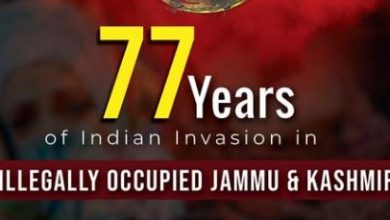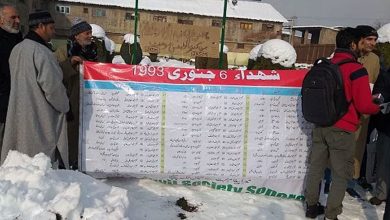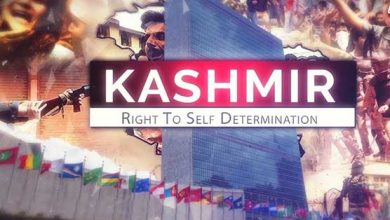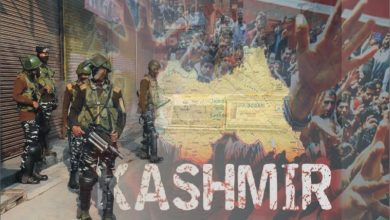Screenplay of deceit: Unmasking media and Bollywood’s role in distorting the narrative of Article 370
Tayyeba Parvez

In an era where borders blur and information flow unceasingly, media has emerged as a formidable force shaping our reality. Its pervasive influence extends far beyond entertainment, crafting the narratives that mold our political landscapes. As we navigate this interconnected world, understanding the media’s role in steering political discourse becomes not just relevant, but essential. The stories and the images we encounter are more than just news; they are powerful tools that shape opinions and drive the pulse of global politics.
Even in conflicts and clashes, communications and dialects play a pivotal role, defining the opinions of the public, government and the other stakeholders which can either exacerbate or alleviate the tensions. The Kashmir conflict, one of the most contentious issues between India and Pakistan, serves as a prime example of how media narratives can impact conflict dynamics. Through its portrayal of the conflict, media continues to shape perception and influence ongoing struggle.
In the context of Kashmir, the media operates under significant constraints, with much of the information disseminated being filtered and biased to advance India’s nationalistic agendas. As the media is largely subsidized by the Indian government, it provides veil to the atrocities committed by the Indian authorities in the occupied territory. Initially, India’s despotic government used both social media and mainstream media to obscure these atrocities, more recently, it has also leveraged Bollywood industry to reinforce its narrative. By controlling narratives through these powerful platforms, the Indian government seeks to present a distorted version of reality that contradicts the genuine grievances and aspirations of the Kashmiri people. This strategic manipulation not only conceals the truth but also actively shapes public perception to align with political agendas, rather than reflecting the on-ground realities.
In recent years, India used Bollywood industry for shaping narratives, manipulating history and tarnishing the image of Pakistan. Films like The Kashmir Files”, “Fighter” and “Article 370” exemplify this trend, where cinema becomes a tool for shaping political and historical discourse. India purposefully crafted false narratives and presenting skewed information. This manipulation underscores the powerful role media plays in shaping both domestic and international viewpoints, highlighting how Bollywood’s storytelling is intricately linked with broader geopolitical strategies.
The intensity with which India is now propagating false information has doubled now. With the release of “The Kashmir Files”, India sought to present an exaggerated and distorted account of exodus of Hindu Pandits, aiming to reshape historical narratives. Similarly, in “Fighter” movie India portrayed itself as a proponent of peace, framing Balakot insurgency as a response to Pakistan’s alleged wrongdoings.
Furthermore, India released “Article 370” in which India tried to justify the killing of Burhan Wani, a Kashmiri freedom fighter, by presenting it as a mere mishap or a case of mishandling by Indian forces without prior permission of the concerned authorities. They are trying to oversimplify a complex narrative potentially condoning violence and ignoring the human cost of the conflict. They also systematically presented the narrative that revocation of Article 370 is a very justified move and it has been in the pipeline for so long. It has been done for the betterment of Kashmiri people. By presenting the abrogation of Article 370 as a necessary step for national unification, the film neglects the Kashmiri people’s perspectives and the broader historical context.
The plot twists orchestrated by the Indian government are just too implausible and based on fabricated stories, both of which violate fundamental human rights. The Indian state has a direct hand in distorting the ideas and the actual nature of the conflict. It became a new norm in India to imagine the democratic character of state policy while, at the same time, violating human rights, murdering innocent people unlawfully on the pretext of being terrorists, and nefariously fabricating a narrative of “all is well” possibly through press sabotage.
The Modi regime, with its deep-rooted ties to the RSS, has wielded its power with devastating consequences for Muslims, particularly Kashmiri Muslims in Indian Illegally Occupied Jammu and Kashmir (IIOJK). From the revocation of their special status to orchestrating demographic changes, the Indian government has systematically stripped the people of IIOJK of any semblance of liberty or opportunity to voice their suffering. The relentless media propaganda against Muslims, coupled with a distorted portrayal of history and the manipulation of narratives, has exacerbated tensions and undermined regional peace.
India’s education system, filled with historical distortions, state-centric newspapers, and biased TV channels, further complicates the issue. The cries of the Kashmiri people are drowned out, failing to reach international audiences, while Indian and global media’s negligence perpetuates the complexity of the Kashmir issue. The Indian government’s attempts to justify its actions through films like “Kashmir Files,” “Fighter,” and “Article 370” are not only an affront to historical accuracy but also risk inflaming tensions further.
The Modi regime’s relentless assault on Kashmiri Muslims and its ruthless manipulation of history through state-controlled media have exacerbated the sufferings of innocent Kashmiris and undermined peace in the region. The distortion of facts and the dissemination of biased narratives have created a dangerous atmosphere where the cries for justice are muffled and the quest for self-determination remains thwarted.
In this dire situation, Pakistan remains steadfast in its commitment to exposing the nefarious agenda of fascist Modi regime. With its firm dedication to human rights and justice, Pakistan will persist in amplifying the voices of the Kashmiri people and will continue to spotlight their plight on the international stage until they are granted their rightful self-determination. The struggle for Kashmir’s freedom and justice remains a priority and Pakistan will not relent in its efforts to ensure that the world acknowledges and addresses the deep-rooted injustices inflicted upon the Kashmiri people.
Writer is pursuing MPhil in IR from NDU and research assistant at Kashmir Institute of International Relations, Islamabad.








